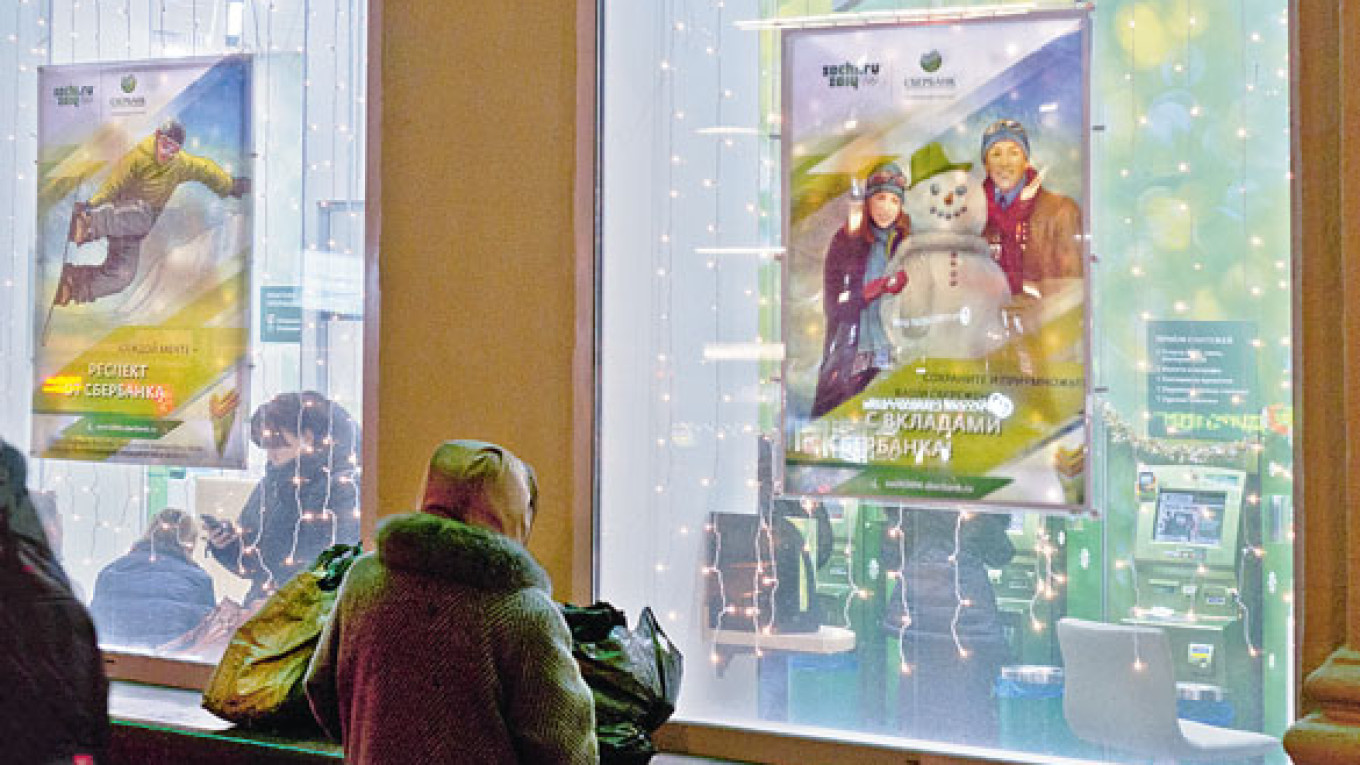Sberbank,? Russia's largest bank, sees no threat to its business from the political upheaval in? Ukraine? for now and will be able to absorb losses there thanks to its strong capital base, chief executive German? Gref? said in an interview.
Sberbank? had exposure of 130 billion rubles ($4 billion) to? Ukraine? — or less than 1 percent of its balance sheet of $460 billion — at the end of the third quarter.
Ukrainian President? Viktor Yanukovych? has faced massive protests over the last couple of weeks after he pulled out of a free-trade deal with the? European Union? and sought closer ties with former Soviet master Moscow.
The turmoil has put further strain on? Ukraine's finances, as the government seeks help to cover an external funding gap of $17 billion next year — almost the level of the central bank's depleted currency reserves.
Ratings agency Moody's estimates the? Ukraine? exposure of? Russia's leading state banks at $20 billion to $30 billion, posing risks to their asset quality and capital adequacy.
"If there will be problems in? Ukraine? we will be the last who will feel it,"? Gref? said, pointing to a strong tier one capital adequacy ratio of? Sberbank's Ukrainian unit of 13 percent, which is higher than for the group as a whole.
"The question is how long this situation will last and how it will hit economic indicators. If it will be a manageable process … they will take a walk and remember to return to work … If the process will linger then problems may arise."
He said? Sberbank? had not yet created any additional provisions for its Ukrainian portfolio, whose quality Gref? described as "high."
Sberbank? has not been officially approached by? Ukraine? for any financial support. Its investment banking unit,? Sberbank? CIB, arranged and participated in a $750 million syndicated loan to? Ukraine? in September.
Russia? acknowledged last month that its economy would grow by just 2.5 percent a year to 2030, lagging global growth and setting the stage for an era of stagnation.
Gref, a former economy minister who took charge at? Sberbank? in 2007, said the weaker economy was already starting to undermine the quality of the bank's corporate loan portfolio and that it was setting aside provisions to cover doubtful loans.
"The deterioration is happening almost everywhere — only telecoms and retail do not yet feel it strongly," he said. "We are starting to hedge [with higher provisions] some deals in our corporate portfolio."
In the third quarter,? Sberbank's loan-loss provisions quadrupled to 44 billion rubles. New loans needed to be covered,? Gref? said, while business conditions had weakened for some big clients.
"There are significant sectoral risks, risks related to a group of some large borrowers," he said. "But I think we have the capacity to absorb those risks."
Metals and mining companies face particular difficulty. Aluminum producer? RusAl, coal miner Mechel and steelmaker Evraz, have sought state aid to help them restructure loss-making operations.
Sberbank? has just agreed to waive covenants on $1.4 billion in loans to Mechel as part of a restructuring of the New York-listed miner's total debts of $9.6 billion.
Gref? said there was no need for the type of state bailouts handed out after the 2008 financial crash, which hit the prices of? Russia's raw materials exports and caused the economy to shrink by 8 percent the following year.
"During the crisis of 2008-09, capital markets were closed and [metal and mining companies] could not refinance their external debts. Now fund raising is happening internally,"? Gref? said.
Aluminum giant? RusAl? — another big? Sberbank? borrower — is battling weak aluminum prices as it tries to cope with net debts of $10.1 billion at the end of the third quarter.
Sberbank? took on a state bailout loan to? RusAl, now worth $4.6 billion that matures in September 2016. The loan is secured against? RusAl's stake in? Norilsk Nickel, the world's leading miner of nickel and palladium.
Asked about? RusAl,? Gref? said the company had not yet asked to restructure its? Sberbank? loan, but there could be a discussion of extending the maturity of the loan.
A Message from The Moscow Times:
Dear readers,
We are facing unprecedented challenges. Russia's Prosecutor General's Office has designated The Moscow Times as an "undesirable" organization, criminalizing our work and putting our staff at risk of prosecution. This follows our earlier unjust labeling as a "foreign agent."
These actions are direct attempts to silence independent journalism in Russia. The authorities claim our work "discredits the decisions of the Russian leadership." We see things differently: we strive to provide accurate, unbiased reporting on Russia.
We, the journalists of The Moscow Times, refuse to be silenced. But to continue our work, we need your help.
Your support, no matter how small, makes a world of difference. If you can, please support us monthly starting from just $2. It's quick to set up, and every contribution makes a significant impact.
By supporting The Moscow Times, you're defending open, independent journalism in the face of repression. Thank you for standing with us.
Remind me later.


